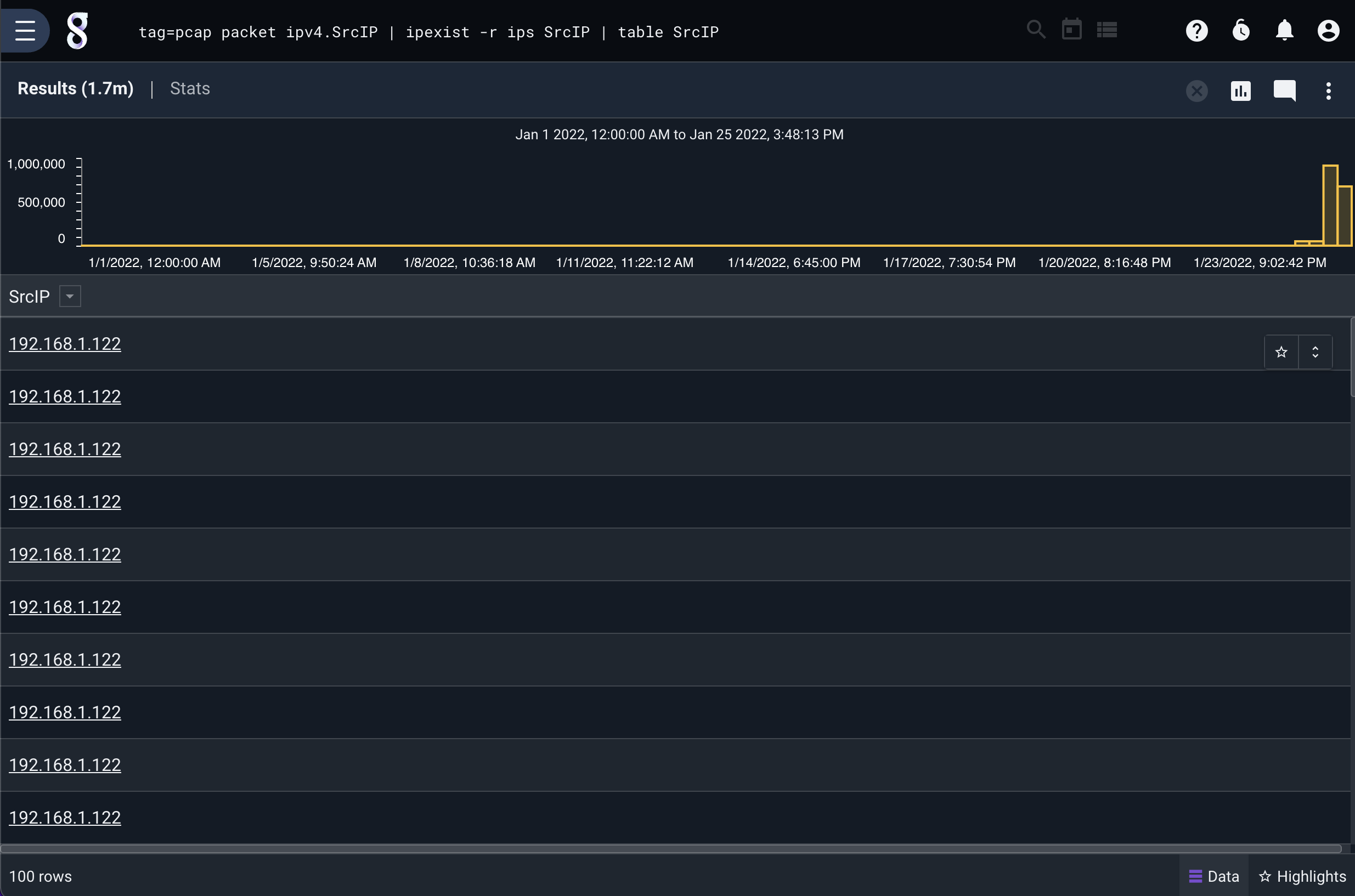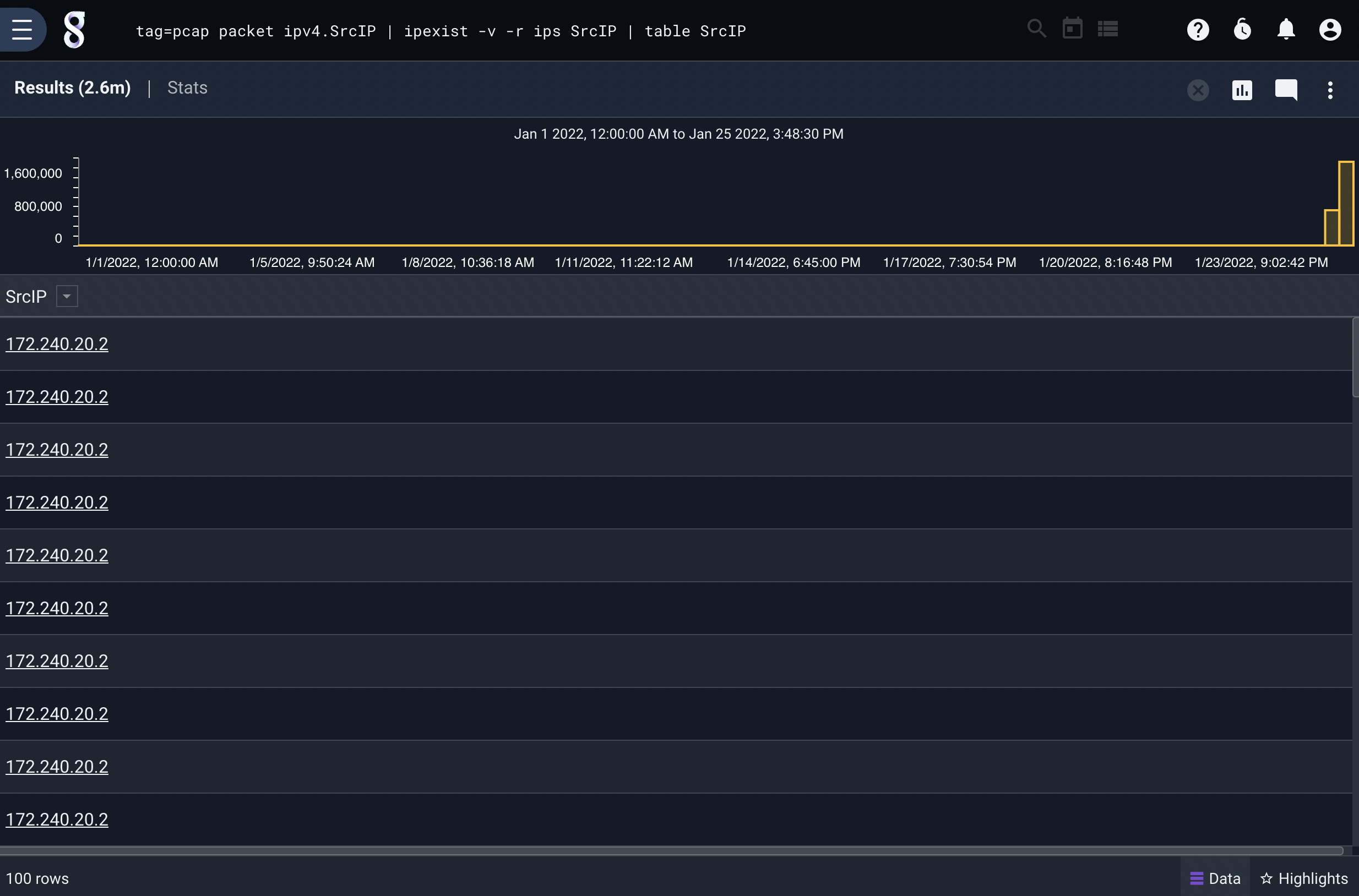IPexist#
The ipexist module is designed to perform simple existence checks on IP addresses as fast as possible. It uses Gravwell’s ipexist library to manage sets of IP addresses and quickly query the existence of a given IP within the set. Users specify one or more enumerated values to match against the set; by default, if all enumerated values match addresses within the set, the entry is passed.
Note
The ipexist module only operates on IPv4 addresses. All entries that attempt to match on an IPv6 address will be dropped.
Supported Options#
-r <resource>: The “-r” flag specifies the name of a resource containing an ipexist-formatted lookup set. This flag may be specified multiple times to attempt lookups across multiple resources. See below for more information on creating these sets.-v: The “-v” flag tells the ipexist module to operate in an inverse mode. Thus, where the queryipexist -r ips SrcIPwould normally pass through any entries whose SrcIP matches an ip in the resource,ipexist -v -r ips SrcIPwould instead drop those entries and pass all others.-or: The “-or” flag specifies that the ipexist module should allow an entry to continue down the pipeline if ANY of the filters are successful.
Creating IP sets#
The ipexist module uses a specific format to store sets of IPv4 addresses that is designed to allow fast lookups while also remaining relatively space-efficient. This format is implemented in the ipexist library, which includes a tool to generate the sets at the command line.
In order to install the tool, you need to have git and the Golang compiler installed.
First, clone the opensource Gravwell repository:
git clone https://github.com/gravwell/gravwell
Then build the tool:
cd gravwell/ipexist/textinput && go build
Then populate a text file with the list of ip addresses you wish to have in the set, one IP per line. Ordering does not matter:
10.0.0.2
192.168.3.77
10.3.2.1
8.8.8.8
Then run the textinput tool, giving it the path to the input file and a path for the output:
./textinput -i /path/to/inputfile -o /path/to/outputfile
This should produce a properly-formatted output file which can be uploaded as a resource for use with the ipexist module.
Example Usage#
Assuming packets are captured under the pcap tag, the following query will only pass those packets whose source IP address matches an IP in the ips resource:
tag=pcap packet ipv4.SrcIP | ipexist -r ips SrcIP | table SrcIP

This query will pass any entry whose SrcIP and DstIP is found in the resource:
tag=pcap packet ipv4.SrcIP ipv4.DstIP | ipexist -r ips SrcIP DstIP | table SrcIP DstIP
Adding the -or flag makes the query more relaxed; it will pass any entry whose SrcIP or DstIP is found in the resource:
tag=pcap packet ipv4.SrcIP ipv4.DstIP | ipexist -or -r ips SrcIP DstIP | table SrcIP DstIP
Inverting queries#
The -v flag inverts the query: if you add -v to a query, any entry which would normally be dropped will be passed and vice versa.
This query drops those entries whose source IP addresses are found in the resource:
tag=pcap packet ipv4.SrcIP | ipexist -v -r ips SrcIP | table SrcIP

In the following query, any entry whose SrcIP and DstIP exist in the resource will be dropped. This query essentially says, “show me every packet whose source or destination is not in the known list”.
tag=pcap packet ipv4.SrcIP ipv4.DstIP | ipexist -v -r ips SrcIP DstIP | table SrcIP DstIP
When combined with the -or flag, the module drops any entry where even one of the given enumerated values is found in the resource. In the example below, only those entries whose source IP and destination IP are not found in the resource will pass down the pipeline.
tag=pcap packet ipv4.SrcIP ipv4.DstIP | ipexist -or -r ips SrcIP DstIP | table SrcIP DstIP
Multiple resources#
Multiple unique IP sets may be specified by repeating the -r flag. The ipexists module will essentially treat them as one large set.
tag=pcap packet ipv4.SrcIP | ipexist -r ips -r externalips SrcIP | table SrcIP